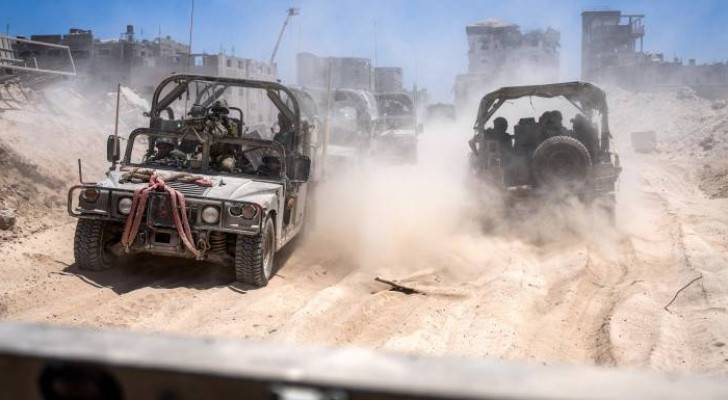Israeli Occupation Forces in Gaza.
Israeli Occupation soldiers admit to killing Palestinians out of boredom
Israeli Occupation soldiers have confessed to killing Palestinians and firing without restrictions in Gaza, driven by "boredom," and leaving their bodies on the streets of the besieged Gaza Strip.
In testimonies from six soldiers, a report by Tel Aviv magazine +972 revealed that soldiers "are permitted to open fire on Palestinians almost at will, including civilians."
Six sources from the army, who fought in Gaza, described how soldiers routinely kill civilians who enter areas the army has designated as "forbidden."
One soldier, identified as "B," who fought in Gaza for several months, stated, "There was complete freedom of action," including at his battalion's command center. He added, "If there is a sense of threat, there is no need to explain, just open fire."
Soldier "B" explained, "When soldiers see someone approaching, they can shoot at their body, not in the air," adding, "It is permissible to shoot everyone, a little girl or an old woman."
Yuval Green, a 26-year-old reservist who fought with the 55th Paratroopers Brigade in November and December of last year, and the only interviewed soldier willing to be named, said, "There were no ammunition restrictions. People fired just to alleviate boredom."
Another reservist, "S," who fought in northern Gaza, mentioned, "People want to experience the whole event. I personally fired a few shots for no reason, into the sea or at the pavement or an abandoned building. They reported it as regular fire, which is code for 'I'm bored, so I shoot.'"
"M," another reservist who fought in Gaza, said that when there are no other forces in the area, "shooting is extremely unrestrained, like madness. And not just small arms: machine guns, tanks, and mortars."
While firing at "hospitals, clinics, schools, religious institutions, and buildings of international organizations requires higher authorization," an officer known as "A" said, "Practically, I can count on one hand the instances we were told not to fire at sensitive targets like schools. Approval seemed more like a formality."
"A" added, "The prevailing spirit in the operations room was: shoot first, ask questions later. This was the consensus... No one would shed a tear if we flattened a house unnecessarily or shot someone."
Hiding the Bodies
The testimonies also revealed that civilian bodies were left along roads and in open areas to decompose or be eaten by stray animals. Soldiers only hid them before the arrival of international aid convoys.
Reservist "S" stated, "The entire area was full of bodies. There were also dogs, cows, and horses that survived the shelling but had nowhere to go. We couldn't feed them and didn't want them getting too close either; sometimes you would see dogs wandering with decaying body parts.
There was a horrific smell of death," adding that before humanitarian convoys arrived, "A D-9 bulldozer, along with a tank, would clear the area of bodies, burying them under rubble and moving them aside so they wouldn't be seen by the convoys."
"S" continued, "We were in a small area. Every day, at least one or two civilians were killed because they were walking in a forbidden zone. I don't know who was a fighter and who wasn't, but most of them weren't armed."
According to the report, out of 324 soldiers killed in Gaza, at least 28 were killed by friendly fire. The testimonies indicated that unrestricted firing was partly responsible for the high number of friendly fire casualties in recent months.
Green testified that the rules of engagement showed "deep indifference" to the fate of detainees in Gaza. According to the testimonies, the rules of engagement did not change even after soldiers killed three detainees waving white flags in December, mistaking them for Palestinians.
Soldier "B" recalled, "Regarding hostages, we had no specific instructions."
Green added, "I heard from other soldiers that the detainees were as good as dead, had no chance, and should be abandoned," adding, "This bothered me more... They kept saying we were there for the hostages, but it was clear the war was harming the hostages. That was my thought back then; today it proves to be true."
The report also highlighted a systematic policy of burning Palestinian homes after occupying them. When soldiers occupied houses, Green testified that the policy was, "If it moves, you have to burn the house."
Soldier "B" confirmed, "Before you leave, burn the house - every house." He added, "This is supported at the battalion commander level. This is so Palestinians cannot return, and if we leave behind any ammunition or food, the militants can't use it."
Green noted that the destruction caused by the Israeli army in Gaza was "unimaginable," adding that soldiers also looted Palestinian homes. He said, "Many soldiers treated the homes like souvenir shops, looting whatever the Palestinian residents couldn't take with them."




